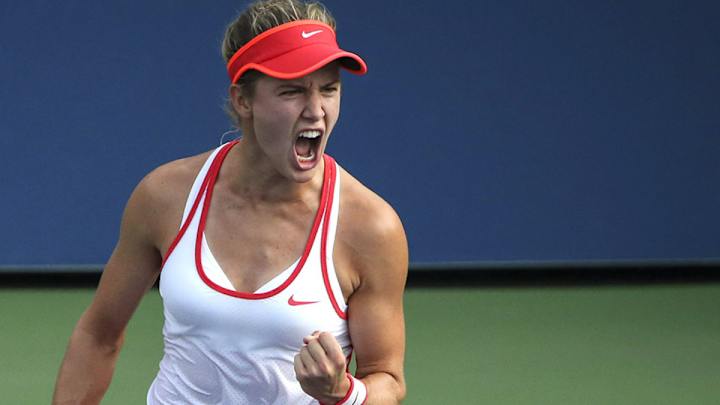Five thoughts on Day 3: Bouchard shows promise, Serena is tested

NEW YORK – Five thoughts from the day session on Day 3 at the U.S. Open.
• It was a painful final match for Mardy Fish—literally and figuratively. Fish has been admirably open discussing the anxiety issues that impacted his career. He put it in his own words here. After winning his first match on Monday, Fish was upgraded to Louis Armstrong Court for his date against Feliciano Lopez. For most of four sets, Fish gave a demonstration of how it was he came to pierce the top ten. He strummed his backhand, served well and covered the court. But serving for the match at 5-4 in the fourth set, Fish floundered. He was broken at love and never recovered. By the fifth set, he began to cramp and, in physical agony, fell 2–6, 6–3, 1–6, 7–5. 6–3. Fish was, understandably, gutted (sorry) afterwards; but the sting of today should not—and does not—obscure an impressive career. And a more impressive comeback.
U.S. Open Day 3: Serena advances; Fish's career comes to an end
• “The Player With the Best Chance of Beating Serena Williams is Serena Williams.” It's the unofficial slogan of the 2015 U.S. Open. It means, essentially, that no player is Serena Williams’s peer. But if the weight of opportunity becomes too much to bear, Serena is vulnerable. While Serena won her match on Wednesday—the collective “whew” was one of the precious few breezes—the principle was animated. For the first hour of her match against No. 41-ranked Kiki Bertens, Serena looked nervous and, therefore, beatable. She missed scads of routine shots (25 unforced errors in the first set), served poorly and was down 3-5 at one point and down 0-4 in the first set tiebreak. We’ve seen this movie before, of course. Serena steadied and won 7-6(5), 6–3. But after dropping zero games and five points in her first match, there were some nervous moments today.
• “Hamilton” might be the hottest show on Broadway. But “Madison” was the hot show here this afternoon. Playing on Arthur Ashe Stadium for the first time, Madison Keys (Queen of the Quad Cities) put a beatdown on Tereza Smitkova, requiring barely an hour to advance—not insignificant on a day like today. Keys has the misfortune of landing in the Serena Williams quarter, but she is the consummate “dangerous opponent.” Meanwhile, Madison Brengle, pride of Delaware, was similarly efficient, beating qualifier Anna Tatishvili in straight sets. Brengle reached the fourth round of the 2015 Australian Open, her best showing at a major. She need only beat lightly regarded Estonian teenager Anett Kontaveit, to get to the fourth round here.
Early U.S. Open upsets pave way for unexpected players to break through
• Genie Bouchard owes Gerry Goldberg dinner. Goldberg is a friend of Bouchard and one of Jimmy Connors’ oldest friends. He connected the two and regardless of whether he is officially Bouchard’s coach, he is clearly in her camp. And, whether it’s causation or correlation, she is now 2-0 under his tutelage. A top player a year ago, Bouchard has of course struggled mightily in 2015. She won her first two matches here, though, showing some of the old confidence and aggressive striking. (Today’s victim: Polona Hercog, in three sets, 6–3, 6–7, 6–3.) Given the chasm that is the second quarter of the women’s draw, Bouchard is suddenly a player to watch again.
• The ever-swelling prize money pool has all sorts of consequences. For one, players eligible for the main draw but in no physical condition to play have entered anyway and then retired. (Why not get the $39,500 first round losers money, just for taking the court?) Another offshoot: players who win a few rounds can completely change their tenor of their careers. A player reaching the third round earns $120,200. It might be negligible to the portfolios of Roger Federer or Serena Williams. But for the majority of the players here, it’s a huge chunk of change. That’s enough to hire a coach, to fund travel, to pay back loans. When, to pick a name, Daria Kasatkina won today, she tripled her career prize money. When you see players win and celebrate as if they won a major, in part it’s because of their performance. But it's also because of the impact of the payday.
SNAPSHOTS FROM DAY 3
U.S. Open 2015 Day 3
Mardy Fish
Jeremy Chardy
Madison Keys
Jamie Murray and John Peers
Marin Cilic
Jeremy Chardy
Bethanie Mattek-Sands
Milos Raonic
Mardy Fish
CoCo Vandeweghe
Bethanie Mattek-Sands
Bethanie Mattek-Sands
Rafael Nadal

Jon Wertheim is a senior writer for Sports Illustrated and has been part of the full-time SI writing staff since 1997, largely focusing on the tennis beat , sports business and social issues, and enterprise journalism. In addition to his work at SI, he is a correspondent for "60 Minutes" and a commentator for The Tennis Channel. He has authored 11 books and has been honored with two Emmys, numerous writing and investigative journalism awards, and the Eugene Scott Award from the International Tennis Hall of Fame. Wertheim is a longtime member of the New York Bar Association (retired), the International Tennis Writers Association and the Writers Guild of America. He has a bachelor's in history from Yale University and received a law degree from the University of Pennsylvania. He resides in New York City with his wife, who is a divorce mediator and adjunct law professor. They have two children.
Follow jon_wertheim